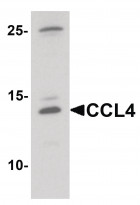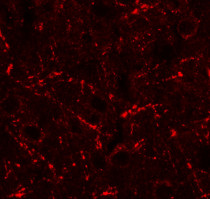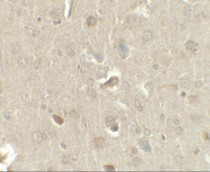ARG54944
anti-CCL4 / MIP1 beta antibody
anti-CCL4 / MIP1 beta antibody for ELISA,ICC/IF,IHC-Formalin-fixed paraffin-embedded sections,Western blot and Human,Mouse,Rat
Immune System antibody
Overview
| Product Description | Rabbit Polyclonal antibody recognizes CCL4 / MIP1 beta |
|---|---|
| Tested Reactivity | Hu, Ms, Rat |
| Tested Application | ELISA, ICC/IF, IHC-P, WB |
| Host | Rabbit |
| Clonality | Polyclonal |
| Isotype | IgG |
| Target Name | CCL4 / MIP1 beta |
| Antigen Species | Human |
| Immunogen | Synthetic peptide (15 aa) within the first 50 aa of Human CCL4. |
| Conjugation | Un-conjugated |
| Alternate Names | C-C motif chemokine 4; MIP-1-beta; Act-2; Protein H400; Small-inducible cytokine A4; ACT2; MIP-1B; Macrophage inflammatory protein 1-beta; Immune activation protein 2; SIS-gamma; ACT-2; Mip1b; Scya4; AT744.1 |
Application Instructions
| Application Suggestion |
|
||||||||||
|---|---|---|---|---|---|---|---|---|---|---|---|
| Application Note | * The dilutions indicate recommended starting dilutions and the optimal dilutions or concentrations should be determined by the scientist. | ||||||||||
| Positive Control | Rat Brain Tissue Lysate |
Properties
| Form | Liquid |
|---|---|
| Purification | Affinity purification with immunogen. |
| Buffer | PBS and 0.02% Sodium azide |
| Preservative | 0.02% Sodium azide |
| Concentration | 1 mg/ml |
| Storage Instruction | For continuous use, store undiluted antibody at 2-8°C for up to a week. For long-term storage, aliquot and store at -20°C or below. Storage in frost free freezers is not recommended. Avoid repeated freeze/thaw cycles. Suggest spin the vial prior to opening. The antibody solution should be gently mixed before use. |
| Note | For laboratory research only, not for drug, diagnostic or other use. |
Bioinformation
| Database Links | |
|---|---|
| Gene Symbol | CCL4 |
| Gene Full Name | chemokine (C-C motif) ligand 4 |
| Background | CCL4 Antibody: CCL4, also known as macrophage inflammatory protein 1-beta (MIP1B), belongs to the intercrine beta (chemokine CC) family. Both CCL4 and the related protein CCL3 participate in the host response to invading bacterial, viral, parasite and fungal pathogens by regulating the trafficking and activation state of selected subgroups of inflammatory cells. While both CCL4 and CCL3 exert similar effects on monocytes, their effect on lymphocytes differ; with CCL4 selectively attracting CD4+ lymphocytes and CCL3 selectively attracting CD8+ lymphocytes. Additionally, both have been shown to be potent chemoattractants for B cells, eosinophils and dendritic cells. The processed form of CCL4 can induce down-modulation of surface expression of the chemokine receptor CCR5, thus inhibiting the CCR5-mediated entry of HIV-1 in T cells. |
| Function | Monokine with inflammatory and chemokinetic properties. Binds to CCR5. One of the major HIV-suppressive factors produced by CD8+ T-cells. Recombinant MIP-1-beta induces a dose-dependent inhibition of different strains of HIV-1, HIV-2, and simian immunodeficiency virus (SIV). The processed form MIP-1-beta(3-69) retains the abilities to induce down-modulation of surface expression of the chemokine receptor CCR5 and to inhibit the CCR5-mediated entry of HIV-1 in T-cells. MIP-1-beta(3-69) is also a ligand for CCR1 and CCR2 isoform B. [UniProt] |
| Research Area | Immune System antibody |
| Calculated MW | 10 kDa |
Images (3) Click the Picture to Zoom In
-
ARG54944 anti-CCL4 / MIP1 beta antibody WB image
Western blot: Rat brain tissue lysate stained with ARG54944 anti-CCL4 / MIP1 beta antibody at 1 ug/ml dilution.
-
ARG54944 anti-CCL4 / MIP1 beta antibody IHC image
Immunohistochemistry: CCL4 in Rat brain tissue stained with ARG54944 anti-CCL4 / MIP1 beta antibody at 20 ug/ml dilution.
-
ARG54944 anti-CCL4 / MIP1 beta antibody IHC image
Immunohistochemistry: CCL4 in Rat brain tissue stained with ARG54944 anti-CCL4 / MIP1 beta antibody at 2.5 ug/ml dilution.








